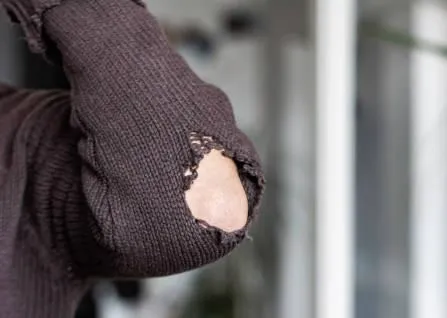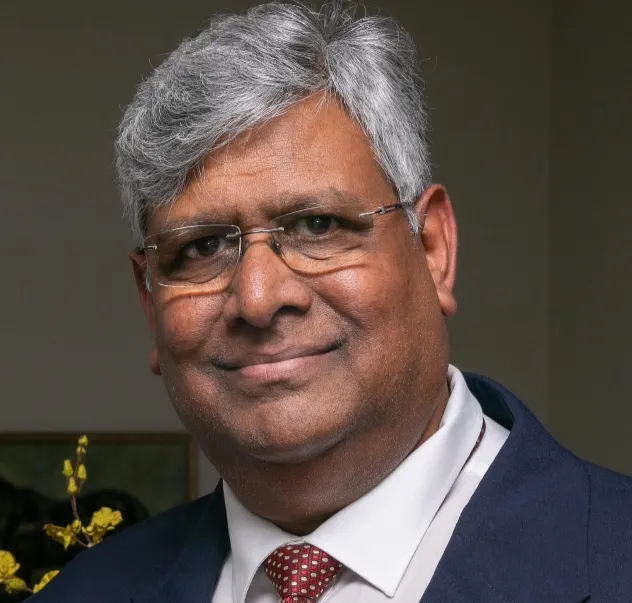
But for me my old clothes aren’t signs of neglect. They’re proof of presence, says the writer.
Image: Pexels.com
AS I WAS minding my own business and getting dressed one recent morning, my wife asked: “Do you know the shirt you are wearing is torn in the back?”
I replied I was aware and added: “So what? People wear torn jeans all the time. In fact, they buy them with far bigger holes than the tear in my shirt. And pay even more than normal jeans.”
Of course my dear wife - she is the thread that stitches my soul together (pun unintended) - did not accept my contention and left the room mumbling that it was embarrassing for her to be seen in public with me dressed like that. This minor disagreement got me thinking about our value system.
A shirt with a small tear might get side-eyed at a formal event but a pair of jeans with gaping holes indicates impeccable grooming. And the price tag? Often higher than pristine ones, because that “lived-in” look is carefully engineered. What used to be a sign of wear or poverty is now a badge of style and rebellion.
Ripped jeans have gone from “why are there holes?” to “how much for those holes?”
Pre-distressed jeans such as Levi’s and Diesel that command premium prices are the perfect example of how culture reclaims imperfection and turns it into identity. In a world obsessed with perfection, wear and tear often get dismissed as damage. But look closer, and you’ll see something far more profound in well-worn garments: a quiet celebration of life, resilience, and authenticity.
I do not wear jeans that are deliberately torn in the name of fashion. I believe it is a waste of money to buy destroyed jeans. But I have a pair or two of house brand jeans with hems frayed from age. I also have scuffed shoes and shirts that have faded from too many washes. The woman I am destined to spend the rest of my life with often threatens, with the support of my daughter, to get rid of all my old clothes.
But for me my old clothes aren’t signs of neglect. They’re proof of presence. They tell stories of movement, of moments lived, of experiences that left their mark figuratively - as well as literally in the form of indelible red curry and black ink stains on shirt fronts. Wear and tear allows me to be unapologetically human.
My mother did not chase after Le Creuset pots. She valued substance over status, practicality over prestige. Cast iron Le Creuset with its rainbow of colours may symbolise a kind of aspirational domesticity. But my mother preferred cooking tools that worked well, regardless of brand. She doted on her dented and battered pots that she had cooked in for decades, from the days my father earned just enough to keep the hearth alive.
Ma served meals that tasted of love, not luxury. Her kitchen was not curated with matching jars, spotless granite counters, or Pinterest-worthy aesthetic - it was lived in. Now somebody please tell my wife that beauty isn’t always polished. Sometimes it lives in the frayed hems of jeans that have walked through years of memories. In the faded shirts that have softened with time and comfort. In my old wristwatch which shows the date as 10 days before or after what it actually is. In the baggy fleecy jacket that was once navy, now tinged with purple - like it’s been kissed by the sun and stories.
There’s grace in age-related wear and tear, charm in imperfection, and a quiet elegance in things that have lived. In my old clothes I find something timeless: character. My new shirts can remain crammed on the rack for all I care. It is the ones with the worn collars that remind me that I’ve lived - and that’s something worth celebrating. Advancing years, like old things, also have great value.
Age is a great teacher. It allows us to learn, not through textbooks but through lived experiences. Wisdom cannot be plucked like a book from a library shelf; it’s something that finds us, slowly, as the years unfold. So too is professorship which, in my view, isn’t just about academic accolades or ivory towers - it’s about living a life of meaning, shaped by experience, humility, and the lessons that come from the world beyond lecture halls.
You can attain professorship from the university of life: from watching a robin building a nest from twigs and grass; from the child who repeatedly asks why; from the elder who speaks in silences; from Budgeting 101 which teaches the benefits of bulk-buying toilet rolls and toothpaste from Makro; learning when to speak up and when to walk away; and from the vendor at Blue Lagoon on a Sunday, who balances hope on a plate of spicy pineapple wedges.
Today we see professorships being handed out too liberally, especially by institutions with questionable academic rigor. There is professorial status inflation within South Africa's higher education system, where titles are sometimes awarded for political leverage, commercial gain, or institutional self-interest rather than in exchange for meeting the traditional standards of merit and research. I also know of some local boastful “academics” who graduated overnight into professors through granting sexual favours, not unlike the “casting couch” phenomenon in Hollywood and even Bollywood where aspiring actresses land roles on account of their horizontal gymnastics.
And what about those who use the title “advocate” without actively practising law, only to gain credibility in unrelated fields?
In a world increasingly shaped by image, status, and surface-level success, it is time to choose honesty over vanity. Vanity breeds insecurity. When we chase validation through appearance, possessions, or status, we often end up with superficiality and emotional emptiness. Vanity is a moving target - there’s always someone richer, prettier, more admired. You think you’ve reached the top with a BMW X7 – only to find the guy next door driving a BMW M8.
Vanity is a game you can’t win. It demands constant performance, relentless comparison, and the sacrifice of authenticity. Honesty, on the other hand, builds trust. Never mind that, as my friend Sid often says, “honesty sometimes leads to poverty”.
Whether in relationships, leadership, or community, honesty is the foundation of credibility. People may admire your success, but they’ll follow your integrity. Choosing honesty means embracing imperfection, speaking truth even when it’s uncomfortable, and valuing depth over display. It’s not always easy - but it’s always worth it.
In South Africa, where communal solidarity is fragile, and inequality and corruption have frayed the social fabric, re-centering values around honesty and self-respect could help rebuild trust and unity. The call for honesty is not just moral - it is urgent.
President Cyril Ramaphosa must realise you cannot woo really big investors to this country when the corridors of power reek of graft and corruption. We cannot rebuild trust with vanity projects such as all the stadiums that were built for the 2010 World Cup. We cannot heal division with pretense. We must choose values that elevate character over charisma, substance over spectacle.
We cannot stand and watch when honest people like Babita Deokaran are gunned down for doing the right thing. The Department of Justice must do more to protect anti-corruption fighters as assassinations of whistleblowers, witnesses, lawyers and prosecutors are becoming all too common. Ramaphosa must make it his number one priority to turn South Africa into “an honest state”.
Honesty, though quieter than vanity, is infinitely more powerful. It is the courage to be real in a world that rewards façades. It is the strength to speak truth even when it costs us popularity. Honesty builds trust, nurtures relationships, and grounds us in purpose. It is the foundation of meaningful lives and resilient communities. Let us reward leaders not for their charm, but for their integrity. Let us create cultures - in business, education, and governance - where truth is not punished, but prized. Because when we choose honesty over vanity, we choose depth over decoration, meaning over mimicry, and humanity over hype.

Yogin Devan
Image: File
Yogin Devan is a media consultant and social commentator. Reach him on: [email protected]
** The views expressed do not necessarily reflect the views of IOL or Independent Media.